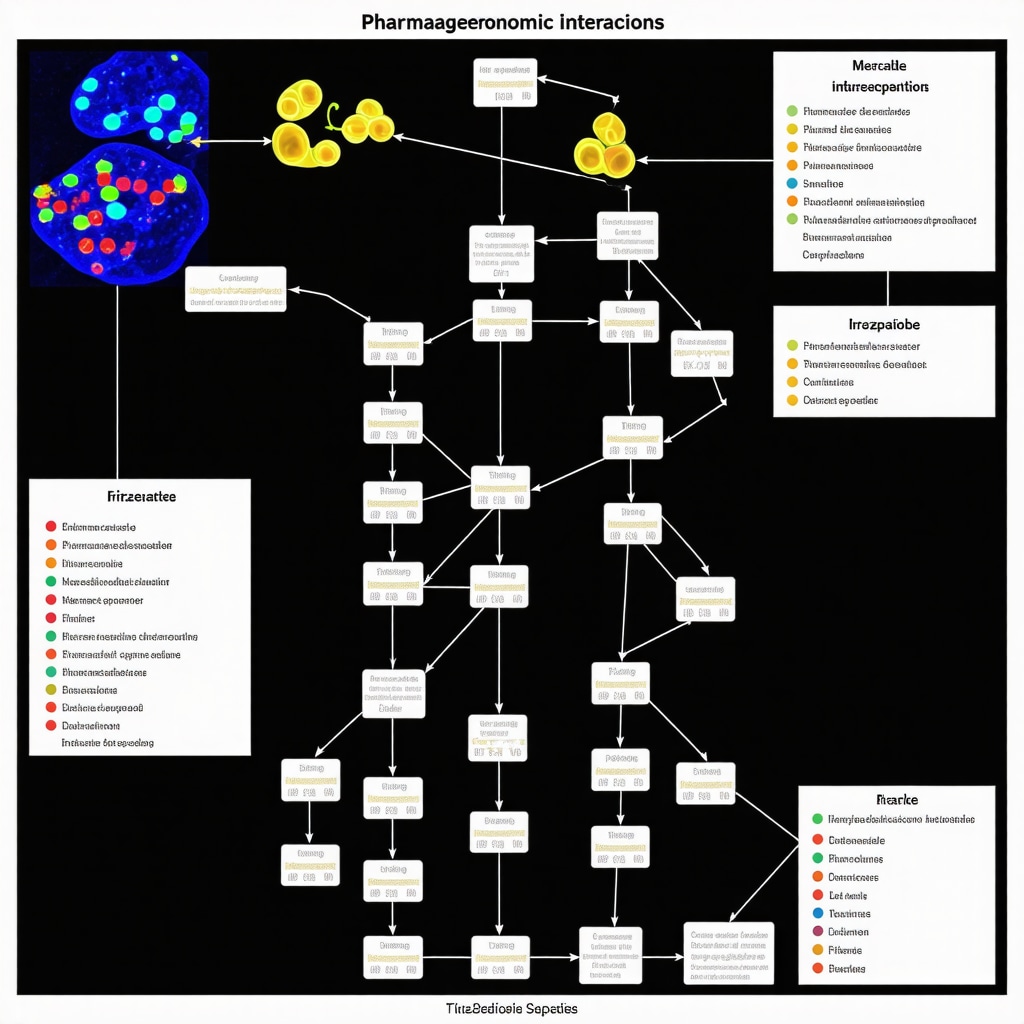Understanding the Therapeutic Potential of Weekly Tirzepatide in NJ’s Weight Loss Landscape
Within the evolving arena of obesity medicine, weekly tirzepatide injections have emerged as a scientifically robust intervention for sustainable weight reduction. This dual glucose-dependent insulinotropic polypeptide (GIP) and glucagon-like peptide-1 (GLP-1) receptor agonist offers a sophisticated pharmacological mechanism that enhances satiety and optimizes metabolic regulation. NJ’s medical community increasingly leverages tirzepatide under strict physician supervision to harness its efficacy while ensuring patient safety, reflecting a paradigm shift towards integrating advanced injectable therapies within comprehensive obesity management programs.
Mechanistic Nuances that Differentiate Tirzepatide from Conventional Weight Loss Agents
Tirzepatide’s unique bimodal receptor activity distinguishes it from traditional GLP-1 receptor agonists by simultaneously activating GIP receptors, which modulates insulin secretion and energy homeostasis synergistically. This dual agonism not only amplifies appetite suppression but also facilitates improved glycemic control, thereby addressing comorbidities often associated with obesity. Its pharmacokinetics allow for once-weekly dosing, a critical factor enhancing adherence in clinical practice. This innovation embodies a sophisticated approach combining endocrinological insights with patient-centric treatment regimens.
How Do Weekly Tirzepatide Injections Compare to Other FDA-Approved Weight Loss Medications in NJ?
In expert clinical forums, a recurrent inquiry pertains to tirzepatide’s comparative efficacy and safety profile relative to other FDA-approved agents such as semaglutide or phentermine-topiramate. Evidence from recent randomized controlled trials, including findings published in the New England Journal of Medicine, demonstrates superior weight loss outcomes and metabolic benefits with tirzepatide. However, patient-specific factors such as comorbid conditions, tolerability, and long-term safety must guide personalized treatment selection. NJ clinicians emphasize the importance of integrating lifestyle modification alongside medication to maximize therapeutic gains.
Clinical Protocols and Safety Considerations in NJ’s Tirzepatide Weight Loss Programs
Safe administration of weekly tirzepatide injections necessitates rigorous clinical protocols encompassing patient selection, dose titration, and monitoring for adverse events such as gastrointestinal disturbances. NJ’s leading obesity medicine experts advocate for multidisciplinary approaches, combining pharmacotherapy with nutritional counseling and behavioral support to mitigate risks and optimize outcomes. Physician-supervised plans enable tailored dosing strategies that respect individual metabolic responses and enhance patient adherence, ensuring long-term success in weight management.
Integrating Tirzepatide Within NJ’s Physician-Supervised Weight Loss Paradigm
Given the complex physiological underpinnings of obesity, NJ practitioners increasingly adopt a holistic model where tirzepatide injections serve as a cornerstone adjunct to lifestyle interventions. This approach reflects an expert consensus that pharmacologic therapy must be embedded within comprehensive care frameworks to address multifactorial contributors to obesity. Patients benefit from personalized consultations, continuous monitoring, and education on medication effects, which together foster sustained fat loss and metabolic health improvements.
For an in-depth, expert-curated exploration of safe tirzepatide injections and their role in NJ weight loss strategies, visit Safe Weight Loss Injections in NJ: Tirzepatide Fat Loss Insights.
If you are a healthcare professional interested in contributing to the evolving discourse on tirzepatide’s clinical applications or seeking advanced guidelines, consider joining our expert network and sharing your insights through our platform.
Optimizing Tirzepatide Dosing Strategies for Individualized Weight Loss Outcomes in NJ
The clinical success of weekly tirzepatide injections significantly depends on personalized dosing regimens that accommodate patient-specific metabolic profiles and tolerability thresholds. NJ obesity medicine specialists emphasize gradual dose escalation protocols beginning at lower doses (e.g., 2.5 mg weekly) with careful monitoring to mitigate gastrointestinal adverse effects, such as nausea and diarrhea, which are common during initiation. These protocols are dynamically adjusted based on patient response and side effect profiles to enhance adherence and maximize fat reduction without compromising safety. Incorporating real-time patient feedback and biomarker assessments supports precision medicine approaches in tirzepatide therapy.
Synergistic Effects of Tirzepatide Combined with Lifestyle Modifications: A Comprehensive NJ Clinical Perspective
While tirzepatide’s pharmacodynamics provide a potent foundation for weight loss, NJ experts highlight the indispensable role of integrated lifestyle interventions, including tailored nutritional plans and structured physical activity. This dual approach is supported by evidence indicating that GLP-1 and GIP receptor agonism potentiates appetite regulation and energy expenditure, which can be further augmented by behavioral modifications. Patient education on diet quality, caloric balance, and exercise routines complements pharmacotherapy, fostering sustainable metabolic improvements and preventing weight regain. Such multidisciplinary programs are increasingly standard in NJ’s weight loss clinics offering weight loss programs combining tirzepatide with lifestyle changes.
What Are the Emerging Clinical Challenges and Solutions in Sustaining Long-Term Tirzepatide Weight Loss in NJ?
One of the prevailing expert questions in NJ’s obesity medicine circles pertains to the durability of tirzepatide’s weight loss effects beyond the initial treatment phase. Addressing this involves understanding potential adaptive physiological responses and patient adherence challenges over extended periods. Clinicians advocate for ongoing patient engagement, periodic metabolic evaluations, and adjusting therapeutic plans to counteract plateau phases. Moreover, integrating behavioral health support and possibly combining tirzepatide with other modalities under physician supervision may enhance long-term outcomes. These considerations underscore the complexity of obesity as a chronic disease requiring adaptive, sustained interventions.
Leveraging Multidisciplinary Collaboration to Amplify Tirzepatide’s Therapeutic Impact in NJ
Effective tirzepatide treatment transcends pharmacology, necessitating coordinated efforts among endocrinologists, dietitians, behavioral therapists, and primary care providers. NJ’s leading clinics exemplify this integrated care model, enabling comprehensive assessment and management of obesity-related comorbidities while tailoring tirzepatide plans to individual needs. This collaborative framework fosters patient empowerment and adherence, critical elements for achieving durable fat loss. For healthcare professionals interested in advancing their expertise on tirzepatide, exploring multidisciplinary protocols is essential.
A detailed exploration of tirzepatide’s pharmacological nuances and clinical protocols can be found in a recent review by the American Journal of Managed Care, emphasizing evidence-based approaches and safety considerations (AJMC: Tirzepatide for Diabetes and Obesity).
We invite clinicians and patients alike to share their experiences and insights on tirzepatide treatment by commenting below or sharing this article with peers to foster a community of informed, empowered stakeholders dedicated to advancing safe and effective weight loss solutions in New Jersey.
Metabolic Biomarkers Guiding Precision Tirzepatide Therapy in NJ’s Diverse Patient Populations
In the quest for precision medicine, NJ clinicians are increasingly turning to metabolic biomarkers to tailor tirzepatide therapy for optimal weight loss outcomes. Biomarkers such as fasting insulin levels, HbA1c, and lipid profiles provide indispensable insights into a patient’s metabolic state, enabling dose adjustments that align with individual physiological responses. Recent studies suggest that patients exhibiting higher baseline insulin resistance may derive enhanced glycemic and weight loss benefits from tirzepatide’s dual agonist mechanism, underscoring the value of integrating laboratory data into clinical decision-making frameworks.
Moreover, the dynamic monitoring of inflammatory markers like C-reactive protein (CRP) aids in evaluating systemic inflammation’s role in obesity pathogenesis and treatment responsiveness. This biomarker-driven approach facilitates early identification of suboptimal responders and guides adjunctive interventions, exemplifying NJ’s commitment to evidence-based, patient-centric obesity management protocols.
Harnessing Digital Health Technologies to Monitor Tirzepatide Adherence and Efficacy in NJ
The integration of digital health platforms represents a transformative strategy in managing tirzepatide therapy adherence and efficacy within New Jersey’s weight loss programs. Wearable devices, mobile applications, and telemedicine consultations collectively enable real-time tracking of patient-reported outcomes, side effects, and behavioral modifications. This continuous data stream empowers clinicians to promptly address adverse events, reinforce lifestyle recommendations, and personalize follow-up schedules.
For instance, adherence monitoring apps equipped with reminders and educational content have demonstrated significant improvements in patient compliance, a critical determinant of long-term success. Furthermore, telehealth expands access to multidisciplinary teams, facilitating comprehensive care even in geographically underserved NJ communities. The convergence of pharmacotherapy and digital innovation epitomizes a forward-thinking, holistic approach to obesity treatment.
How Can Clinicians Mitigate Gastrointestinal Adverse Effects While Maximizing Tirzepatide’s Weight Loss Benefits?
Gastrointestinal (GI) side effects remain the most common challenge during tirzepatide initiation and dose escalation, including nausea, vomiting, and diarrhea. NJ obesity specialists employ several strategies to mitigate these effects without compromising therapeutic efficacy. Gradual titration schedules starting at low doses (2.5 mg weekly) allow the gastrointestinal system to acclimate, minimizing symptom severity. Co-administration with antiemetics or dietary modifications—such as smaller, frequent meals and avoiding high-fat foods—further alleviate discomfort.
Patient education emphasizing realistic expectations and symptom management techniques fosters adherence and reduces premature discontinuation rates. Importantly, clinicians continuously balance dose escalation speed with tolerability, optimizing the therapeutic window to harness tirzepatide’s potent metabolic effects safely. This nuanced management is detailed in clinical guidelines from the American Association of Clinical Endocrinologists, reinforcing NJ’s alignment with national best practices (AACE Tirzepatide Management Guidelines).
Exploring Combination Therapies: Tirzepatide with Adjunct Pharmacologic Agents in Complex Obesity Cases
For patients with refractory obesity or multiple metabolic comorbidities in NJ, emerging clinical paradigms explore the synergistic potential of combining tirzepatide with other pharmacologic agents. Preliminary investigations assess the efficacy of adjunct medications such as SGLT2 inhibitors or selective serotonin reuptake inhibitors (SSRIs) to address intersecting pathophysiological pathways. This multidimensional strategy aims to enhance weight loss magnitude, improve glycemic control, and mitigate psychiatric contributors to obesity.
However, such combination therapies necessitate meticulous monitoring for drug-drug interactions, compounded side effect profiles, and patient safety. NJ’s academic centers are leading rigorous clinical trials to delineate optimal protocols, dosage regimens, and patient selection criteria. This pioneering research reflects a sophisticated understanding that obesity often requires multifactorial therapeutic approaches beyond monotherapy.
Addressing Health Disparities: Ensuring Equitable Access to Tirzepatide in New Jersey’s Diverse Communities
Despite tirzepatide’s clinical promise, equitable access remains a critical issue in NJ’s heterogeneous populations. Socioeconomic factors, insurance coverage variability, and healthcare literacy disparities contribute to uneven adoption of this advanced therapy. NJ healthcare leaders advocate for policy reforms, community outreach programs, and culturally competent educational initiatives to bridge these gaps.
Collaborations with federally qualified health centers and patient advocacy groups aim to facilitate affordable access and support adherence through tailored counseling. Embracing a social determinants of health framework ensures that tirzepatide’s benefits extend beyond privileged cohorts, embodying NJ’s commitment to inclusive, high-quality obesity care.

Decoding the Role of Pharmacogenomics in Personalizing Tirzepatide Therapy
Emerging research in pharmacogenomics is poised to revolutionize the personalization of tirzepatide treatment protocols in New Jersey’s diverse patient cohorts. Genetic polymorphisms affecting GLP-1 and GIP receptor expression or downstream signaling pathways may significantly influence therapeutic responsiveness and adverse effect profiles. Incorporating genotypic screening could enable clinicians to anticipate efficacy and tailor dosing with unprecedented precision, minimizing trial-and-error approaches and optimizing metabolic outcomes.
Such precision medicine frameworks necessitate integration of genomic data with clinical phenotypes to construct predictive models, ultimately facilitating bespoke tirzepatide regimens that align with individual molecular signatures.
Innovative Nutritional Interventions Complementing Tirzepatide’s Mechanisms
Beyond traditional dietary counseling, cutting-edge nutritional strategies—such as time-restricted feeding and macronutrient manipulation—are gaining traction in NJ’s obesity treatment centers to synergize with tirzepatide’s appetite modulation and energy expenditure effects. For instance, ketogenic or low-glycemic index diets may potentiate glycemic control and fat oxidation when combined with tirzepatide, enhancing overall weight loss magnitude while attenuating common gastrointestinal side effects.
Nutritionists collaborating closely with prescribing physicians ensure that these dietary frameworks are safely and effectively adapted to the pharmacological profile of tirzepatide, exemplifying multidisciplinary precision care.
What Are the Best Practices for Managing Tirzepatide Therapy in Special Populations Such as Elderly Patients or Those with Renal Impairment?
Managing tirzepatide in vulnerable populations such as elderly patients or those with compromised renal function requires nuanced clinical judgment. Dose adjustments, vigilant monitoring for hypoglycemia, and assessment of polypharmacy risks are paramount. NJ clinicians emphasize starting with the lowest possible doses and incrementally titrating based on tolerability and therapeutic response. Moreover, comprehensive geriatric assessments and renal function tests must precede initiation and guide ongoing therapy.
Such meticulous management is supported by guidelines from the National Kidney Foundation, underscoring the importance of renal safety considerations in obesity pharmacotherapy.
Harnessing Artificial Intelligence to Predict Tirzepatide Treatment Outcomes
Artificial intelligence (AI) and machine learning algorithms are increasingly deployed to analyze large-scale clinical data sets, enabling predictive modeling of tirzepatide response and adverse event likelihood in NJ’s clinical settings. By integrating variables such as demographic data, metabolic biomarkers, and behavioral adherence patterns, AI tools can stratify patients according to expected benefit-risk profiles, facilitating more informed decision-making and resource allocation.
This data-driven approach enhances the precision of weight loss interventions, reduces trial durations, and supports dynamic treatment adjustments tailored to evolving patient needs.
Exploring Neuroendocrine Interactions Underpinning Tirzepatide’s Efficacy
Advanced neuroendocrinology reveals that tirzepatide’s dual receptor agonism extends its influence beyond peripheral metabolic pathways, modulating central appetite-regulating circuits in the hypothalamus and brainstem. This central action contributes to reductions in hedonic eating and improved satiety signaling, representing a crucial mechanism distinct from monoagonist GLP-1 therapies.
Understanding these neuroendocrine interactions provides avenues for adjunct therapies targeting complementary neurotransmitter systems, potentially amplifying tirzepatide’s therapeutic impact in refractory obesity cases.
Addressing the Challenge of Weight Regain: Strategies for Sustained Tirzepatide Benefits
Weight regain post-therapy discontinuation remains a significant clinical hurdle. NJ experts advocate for structured maintenance programs combining prolonged pharmacotherapy tapering, continuous lifestyle reinforcement, and psychological support to sustain metabolic improvements achieved with tirzepatide. Regular metabolic assessments and behavioral interventions are critical to identify early signs of relapse, enabling preemptive modifications in treatment plans.
Integrating Tirzepatide Into Value-Based Care Models to Enhance Accessibility
To combat health disparities, NJ health systems are exploring value-based care frameworks that incentivize outcomes over volume, thereby promoting equitable access to high-cost therapies like tirzepatide. Bundled payment models and patient-centered medical homes facilitate comprehensive obesity management, ensuring that pharmacologic interventions are coupled with supportive services regardless of socioeconomic status.
Such systemic innovations are vital to democratizing advanced obesity therapeutics and aligning with public health imperatives.
What Emerging Research Should Clinicians Monitor to Stay at the Forefront of Tirzepatide Innovations?
Clinicians aiming to maintain expertise in tirzepatide therapy should closely follow ongoing phase III and IV clinical trials investigating combination regimens, long-term safety, and mechanistic biomarkers. Journals such as Diabetes Care provide rigorous peer-reviewed updates on these developments. Additionally, participation in professional societies’ webinars and consensus conferences offers access to evolving best practices and expert panel insights.
Proactive engagement with emerging evidence ensures that NJ healthcare providers deliver cutting-edge, evidence-based care tailored to the complexities of obesity pharmacotherapy.
Engage with Our Expert Network Today: Expand your clinical acumen and contribute to advancing tirzepatide research by joining NJ’s multidisciplinary obesity medicine consortium. Share your experiences, access exclusive resources, and collaborate on pioneering treatment protocols to transform patient outcomes in weight management.

Expert Insights & Advanced Considerations
Dual Agonism as a Metabolic Catalyst in Tirzepatide Therapy
Understanding tirzepatide’s simultaneous activation of GIP and GLP-1 receptors reveals a sophisticated metabolic synergy that not only promotes appetite suppression but also enhances insulin sensitivity and energy expenditure. This dual mechanism differentiates tirzepatide from monoagonists, offering NJ clinicians a potent therapeutic modality to address complex obesity phenotypes with improved glycemic and cardiovascular profiles.
Personalized Dosing Guided by Dynamic Biomarkers
Incorporating metabolic biomarkers such as HbA1c, fasting insulin, and inflammatory markers into tirzepatide titration protocols enables precision medicine approaches. NJ providers can optimize therapeutic efficacy while minimizing adverse events by tailoring doses to individual metabolic responses, thus fostering higher adherence and sustained fat loss outcomes.
Multidisciplinary Integration Enhances Long-Term Success
Effective tirzepatide treatment transcends pharmacology and requires coordinated care involving endocrinologists, dietitians, behavioral therapists, and primary care providers. NJ’s multidisciplinary frameworks empower patients through comprehensive lifestyle support, behavioral modification, and medical oversight, critical for overcoming physiological adaptations and preventing weight regain post-therapy.
Digital Health Tools as Adjuncts to Clinical Management
Utilizing telemedicine, adherence tracking apps, and wearable technology facilitates real-time monitoring and patient engagement in NJ’s tirzepatide programs. These digital platforms enable timely side effect management, reinforce lifestyle modifications, and support remote multidisciplinary collaboration, significantly enhancing treatment adherence and clinical outcomes.
Addressing Access and Equity to Expand Tirzepatide Impact
Recognizing socioeconomic and healthcare literacy barriers, NJ healthcare leaders advocate for policy reforms and community outreach to democratize access to tirzepatide. Equitable integration within value-based care models and culturally competent education ensures that advanced obesity therapeutics benefit diverse populations across the state.
Curated Expert Resources
American Association of Clinical Endocrinologists (AACE) Tirzepatide Management Guidelines: Authoritative clinical protocols offering evidence-based titration strategies and side effect mitigation techniques essential for expert practice.
New England Journal of Medicine (NEJM) Tirzepatide Trial Publications: Comprehensive randomized controlled trial data providing robust comparative efficacy and safety analyses critical for informed clinical decision-making.
American Journal of Managed Care (AJMC) Reviews on Tirzepatide: Detailed pharmacological insights and real-world safety considerations emphasizing best practices in obesity pharmacotherapy.
Diabetes Care Journal Updates: Ongoing phase III and IV clinical trial reports and biomarker research supporting cutting-edge understanding of tirzepatide’s mechanistic and long-term effects.
National Kidney Foundation Guidelines: Essential renal safety recommendations for managing tirzepatide in special populations such as patients with renal impairment.
Final Expert Perspective
Weekly tirzepatide injections have redefined the therapeutic landscape for weight loss in New Jersey by embodying a mechanistically advanced, patient-centric approach that synergizes pharmacology with lifestyle and technological innovations. Emphasizing precision dosing, multidisciplinary collaboration, and equitable access ensures that this treatment modality not only achieves substantial fat reduction but also maintains metabolic health and long-term adherence. Clinicians and stakeholders committed to advancing obesity care are encouraged to deepen their expertise through continued engagement with evolving research and collaborative networks. For those seeking to integrate or refine tirzepatide-based strategies, explore our comprehensive NJ expert guide to safe tirzepatide injections for fat loss at NJ’s Expert Guide to Safe Tirzepatide Injections and connect with our physician-supervised weight loss programs at Physician-Supervised Tirzepatide Weight Loss in NJ. Engage with the community by sharing professional experiences or inquiries to collaboratively elevate the standards of effective obesity management in New Jersey.

